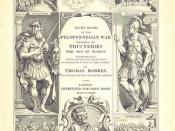HOBBES AND SOVEREIGNTY All throughout history, man has struggled to try to understand society, and looked for a way in which to improve it. This has invoked many philosophers to contemplate the formation and legitimacy of government. One such philosopher was Thomas Hobbes, who went into great depth and detail on this subject of politics, in his incredible works The Leviathan. In this piece of literature, Hobbes describes a natural world that is void of any form of government or society, and explains how everyone in this world lives in constant fear and war. The awful imagery that Hobbes projects of this world of anarchy, which he calls a state of nature, is not left without an explanation of how its people may escape into a lawful society. Thomas Hobbes argues that in order for this escape to occur there must exist an absolute monarch.
In order to understand why Hobbes feels that an absolute monarch is necessary we must first take a closer look at exactly what the state of nature is.
According to Hobbes (Leviathan, 1651), the state of nature was a world, "where there was no place for industry, because the fruit thereof is uncertain; and consequently no culture of the earth, no navigation, nor use of the commodities that may be imported by sea; no commodious building, no instruments of moving and removing such things as require much force; no knowledge of the face of the earth, no account of time, no arts, no letters, no society; and which is worst of all, continual fear and danger of violent death; and the life of people, solitary, poor, nasty, brutish, and short." In a state of nature, everyone would be equal but although equal, everyone would want to dominate everyone else. In turn, this generates a...


